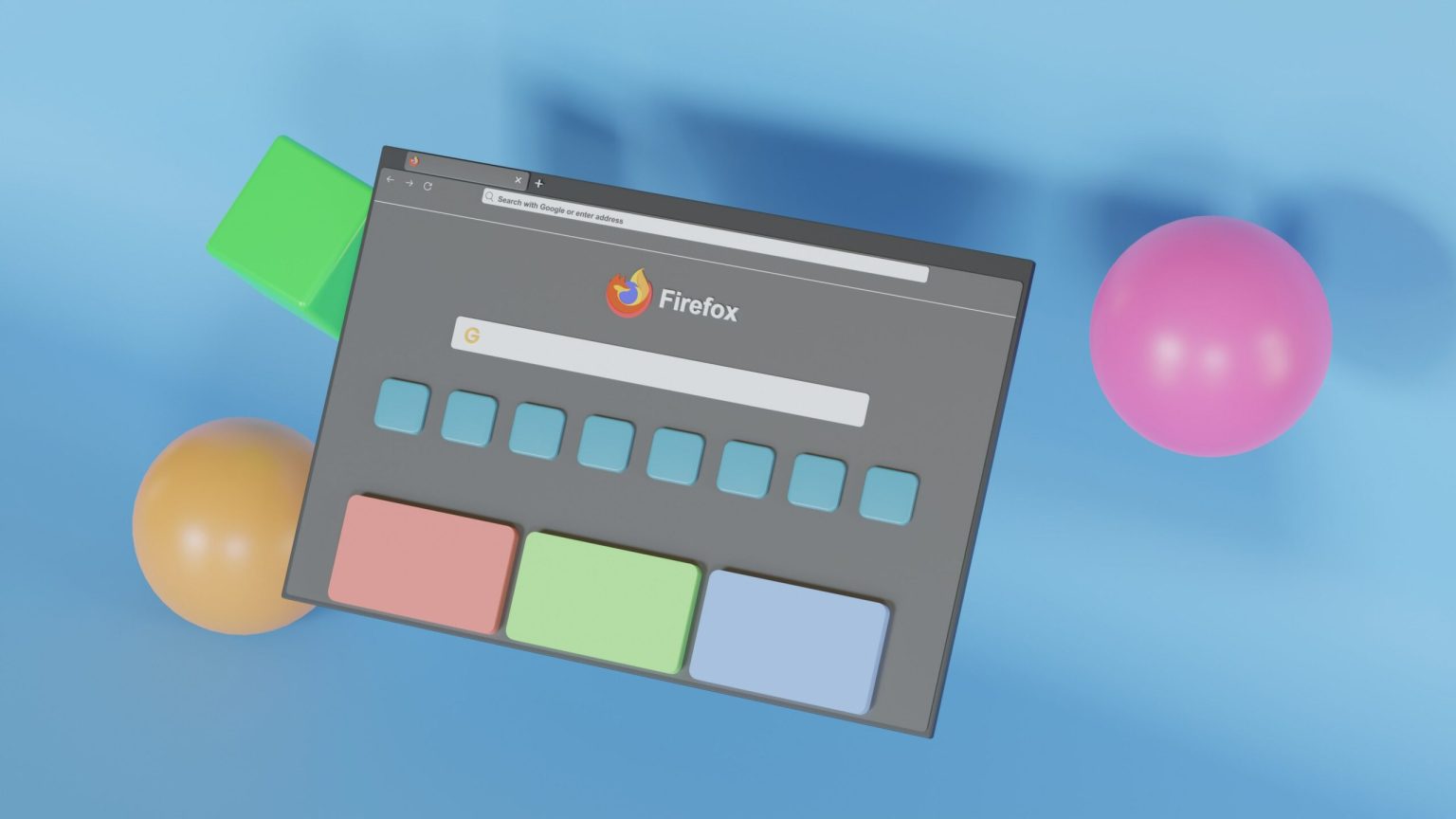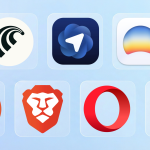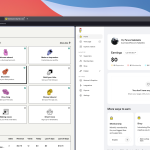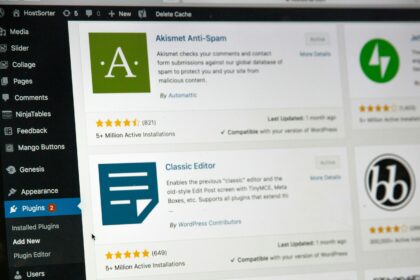Are you wondering what else there is out there except Google Chrome? Maybe looking for a web browser to manage your tabs more efficiently, or even use a company that doesn’t collect personal information? There are many great options out there, each with its own advantages and disadvantages, and most of them are built using the Chromium project, so you’ll have no problems when visiting web pages.
- How to choose the best Web Browser for your needs
- 22 Web Browsers to consider in 2025
- The 8 Most Popular Web Browsers to look at in 2025
- Best web browser for making a difference: Mozilla Firefox
- Best web browser for tabs management and customization: Vivaldi Browser
- Best web browser for speed and privacy: Brave
- Best web browser for stability and AI features: Microsoft Edge
- Best web browser for geeks and gamers: Opera Browser
- Best web browser for surfing the Dark Web: Tor Browser
- Best web browser for everyday use: Google Chrome
- Best web browser for minimalists: Arc Browser
- Best minimal and beautiful Firefox-based browser: Zen Browser
- What is the best overall Web Browser in 2025?
For me, everything started with Netscape, then moved to Internet Explorer, then changed to Mozilla’s Firefox in 2005, then moved to the newest Google’s Chrome browser in 2009, then changed again to Opera for the amazing speed-dial they provided, and finally, I ended up using Vivaldi Browser for the last 5 years.
During all those years, I’ve tested many times various web browsers, from popular ones such as the Brave Browser and the newest Chromium-based Microsoft Edge, to less-known browsers, including Tor, Maxthon, SeaMonkey, Falkon, and Ephemeral browsers which are developed by the Elementor OS team.
How to choose the best Web Browser for your needs
Every browser is designed to serve different needs and personal preferences, depending on the user. Some people are only using their smartphones and tablets, for which they need a touch-friendly browser. For other people, a simple and fast web browser for their everyday use is fine.
And then there are more advanced people like me who have many open tabs simultaneously and they’re doing their best to keep them organized. I also love to have more control over the way my browser looks like, such as customizing the colours and corners, or even changing the background, the homepage, and more. As a user with lots of bookmarks that are organized in folders, I need a good way to keep them organized and quickly available whenever I need them.
A modern web browser should offer its users a version for every operating system and device they may be using, something that is also known as “cross-platform”. So make sure your browser supports Windows, Mac, Linux, Android, and iOS, depending on your ecosystem of choice.
22 Web Browsers to consider in 2025
There are many other web browsers you could consider using in 2025, such as Apple’s Safari for MacBook, Mac Mini, and iMac devices. I haven’t had the opportunity to use the browser, but many people do and they keep it as their default browser. UC Browser, Pale Moon, Epic Privacy Browser, Maxthon, and DuckDuckGo Browser are just a few to name.
To make it even easier, here’s a list of 22 web browsers to consider in 2025:
| Browser | Platforms Available | Underlying Engine |
|---|---|---|
| Vivaldi Browser | Windows, macOS, Linux, Android, iOS, Android Automotive OS | Chromium |
| Google Chrome | Windows, macOS, Linux, Android, iOS | Chromium |
| Mozilla Firefox | Windows, macOS, Linux, Android, iOS | Gecko |
| Microsoft Edge | Windows, macOS, Linux, Android, iOS | Chromium |
| Apple Safari | macOS, iOS | WebKit |
| Arc Browser | Windows, macOS, Android | Chromium |
| Zen Browser | Windows, macOS, Linux | Mozilla Firefox |
| Opera | Windows, macOS, Linux, Android, iOS | Chromium |
| Brave | Windows, macOS, Linux, Android, iOS | Chromium |
| Tor Browser | Windows, macOS, Linux, Android | Mozilla Firefox |
| UC Browser | Windows, macOS, Android, iOS | Chromium |
| Pale Moon | Windows, Linux | Goanna (fork of Gecko) |
| Waterfox | Windows, macOS, Linux | Mozilla Firefox |
| Epic Privacy Browser | Windows, macOS, Linux | Chromium |
| Midori | Windows, Linux | WebKit |
| Maxthon | Windows, macOS, Linux, Android, iOS | Trident/WebKit |
| Konqueror | Linux | KHTML |
| DuckDuckGo Browser | iOS, Android | Chromium |
| Ephemeral Browser | Elementary OS | – |
| SeaMonkey | Windows, macOS, Linux | Mozilla Firefox |
| Falkon | Windows, Linux | Chromium (QtWebEngine) |
| Gnome Web | Linux | WebKit |
And those aren’t even all the web browsers that are available. You can find even more, less known, many of them designed for specific operating systems or needs. But let’s take an even closer look at the 7 most popular web browsers.
The 8 Most Popular Web Browsers to look at in 2025
I’ve used the most known web browsers – and some less popular – to test and see for what use is every web browser better than its competitors. Here’s what I’ve learned about each one of them and how I think everyone is good enough for specific uses:
Best web browser for making a difference: Mozilla Firefox
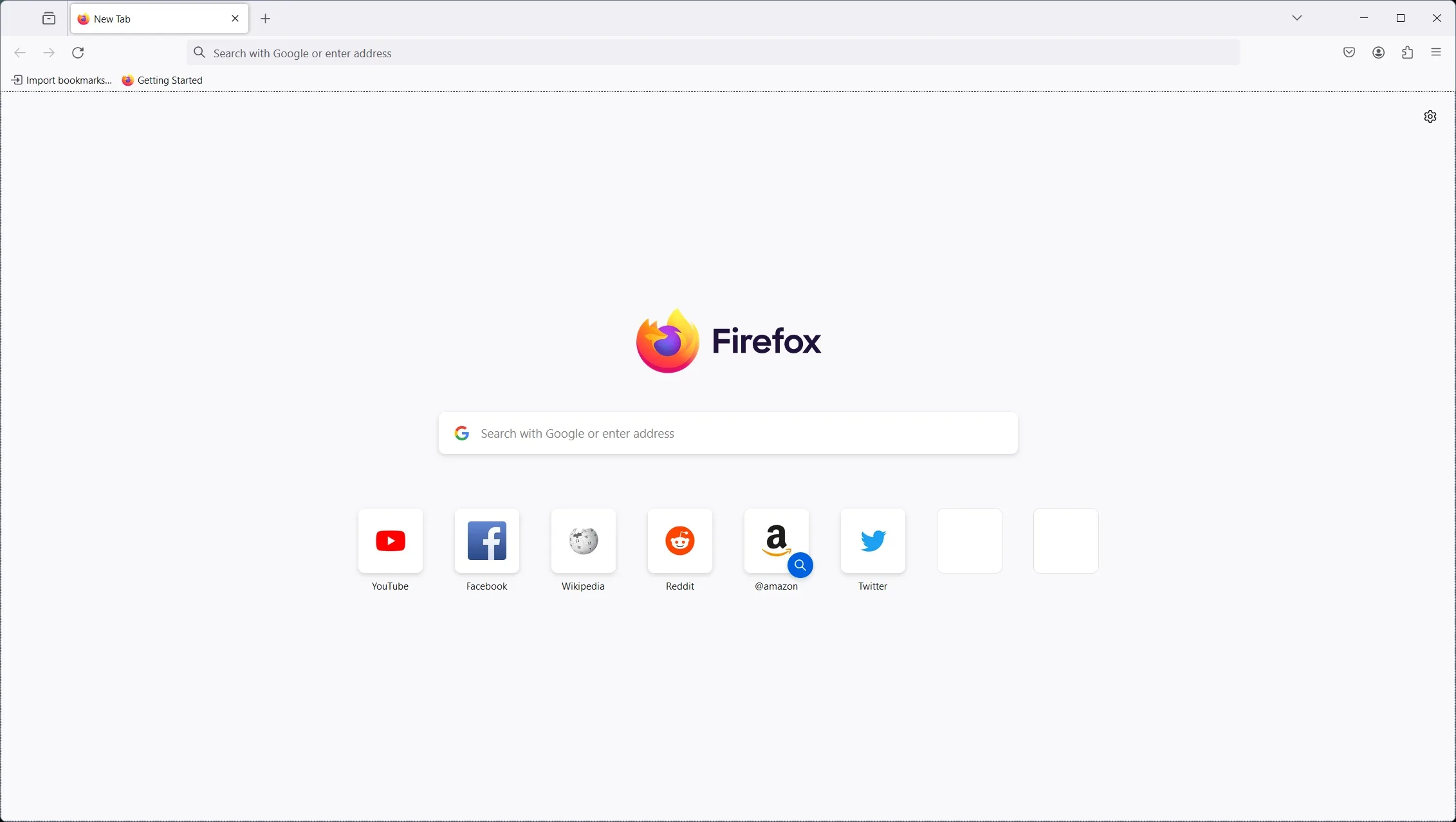
Many people support that by using Mozilla Firefox, you’re making a difference and you enter the fight against a monopoly mostly known as “Google Chrome”. Actually, I think is more about having a choice and supporting diversity in the browser landscape, and having more than just Chromium-based browsers is always good.
Mozilla Firefox has anything you may need, but it’s not for advanced users looking to manage many opened tabs or having different workspaces. It’s better for everyday use for people who want an open-source web browser that is focused on security and privacy. It also comes with hundreds of available add-ons you install so you can increase the browser’s features and possibilities, and with a plethora of themes, but it may feel slower while surfing popular websites such as YouTube.
While I’ve tried many times in the past to move over to Firefox, I never liked its somewhat outdated design and slow development in catching up with the other web browsers. There are tons of improvements that the web browser can see in the near future, and call me crazy, but I truly believe that the end of this browser is coming, sooner or later.
Best web browser for tabs management and customization: Vivaldi Browser
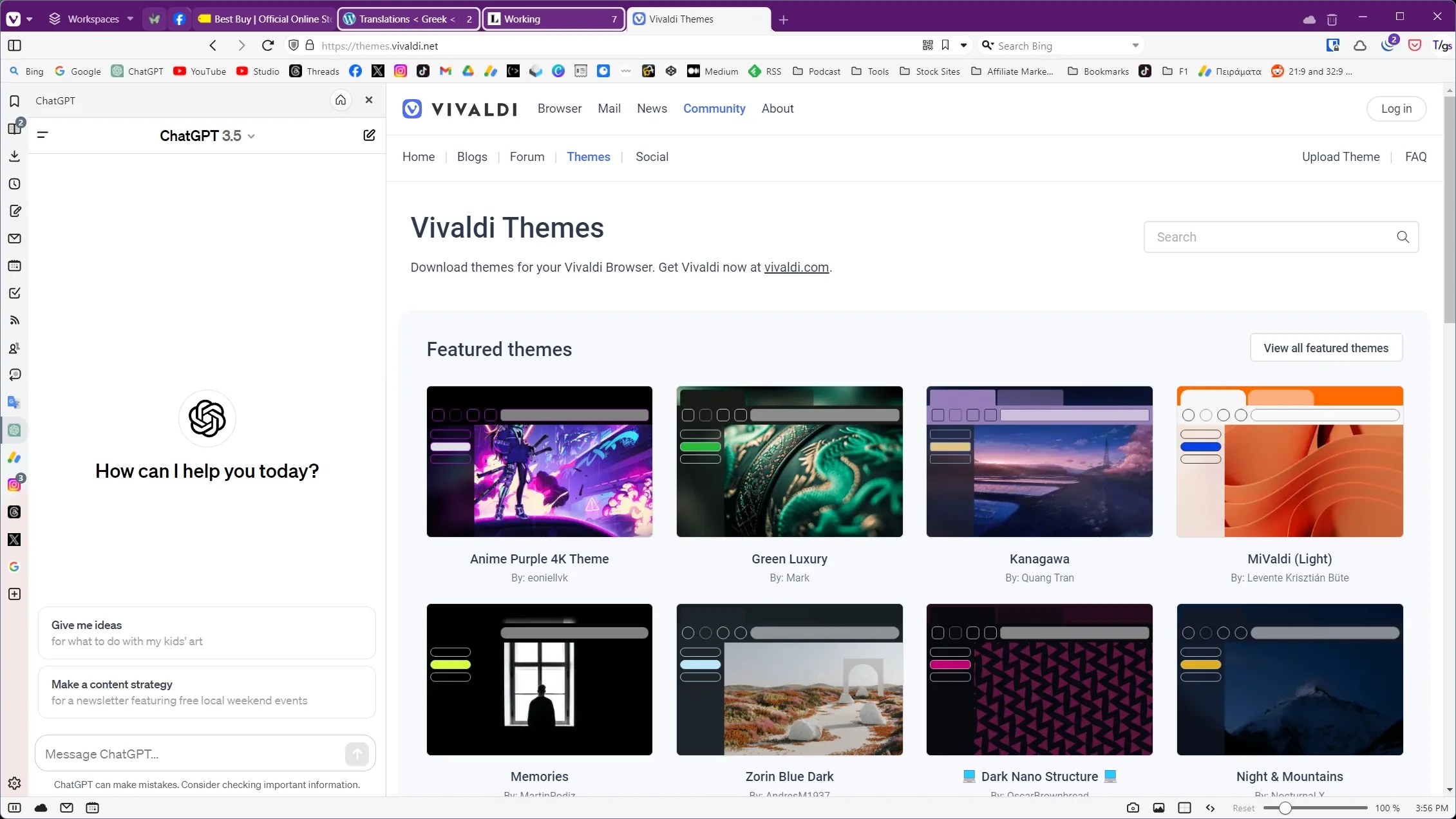
The first stable version of Vivaldi Browser was released on November 3, back in 2015. From that moment until this day, it is still my default web browser on both Windows and Linux, and now on my Android smartphone too. It’s a cross-platform browser that is available even for cars – if you can believe that – and also for the Rasberry Pi. This is a Chromium-based web browser that focuses both on advanced users looking for a fully customizable browser and standard users looking for a minimal interface.
When you install Vivaldi for the first time, you’ll be asked if you want to keep the browser at its default settings, enable all of its settings and tools, or even keep it minimal. Whichever option you choose, you’ll be able to enable or disable any option or feature from the browser’s settings, so don’t worry about it. Vivaldi is known for providing its users with robust features such as the speed-dial with your folders that contain bookmarks, a bookmark list that you can also use for your most used websites, a side-panel with notes, a reading list, a save-for-later list, a translator, your history, and all of your favourite apps.
With Vivaldi, you can change almost everything, from the colours, background image, the radius of the window’s corners, and even the icons. You can also find new themes created by both the team behind Vivaldi and its community on their official website. Every theme can be also customized from the bottom to the top, making it easy to adjust the whole web browser to your own personal preferences and needs. But if you go with all the options enabled, keep in mind that you may see lots of your RAM going into the browser’s needs.
Best web browser for speed and privacy: Brave
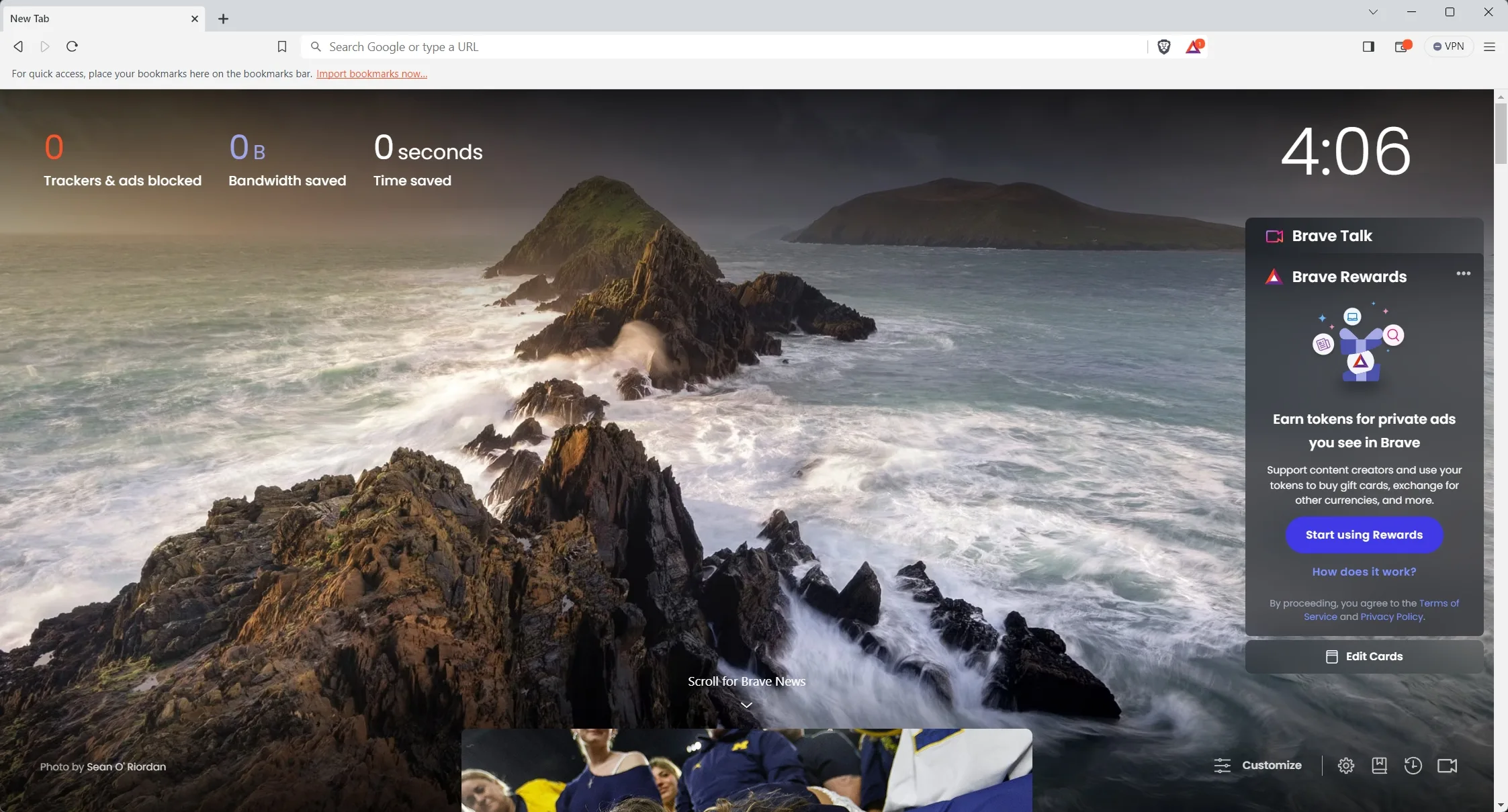
Brave is for people who don’t want many options and are looking for a lightweight, fast, and security and privacy-focused web browser. Most people I know are using Brave with some kind of VPN service enabled to get the most out of their security and privacy while surfing online. It’s a pretty solid browser if you asked me, but I would suggest it for people who tend to have a problem with tab management.
By default, Brave blocks trackers and ads on the websites you visit, keeping you more private online. Thanks to this blocking system, many websites are loading faster, battery life may be increased a bit, and you may save on mobile data. With Brave you all get an independent search, free video calls, offline playlists, and even a customizable news feed, all private and inside your web browser.
Built-in IPFS integration, onion routing with Tor, custom filter lists, and more security features are also available to get the most out of the browser, and it is also available for both Android and iOS.
Best web browser for stability and AI features: Microsoft Edge
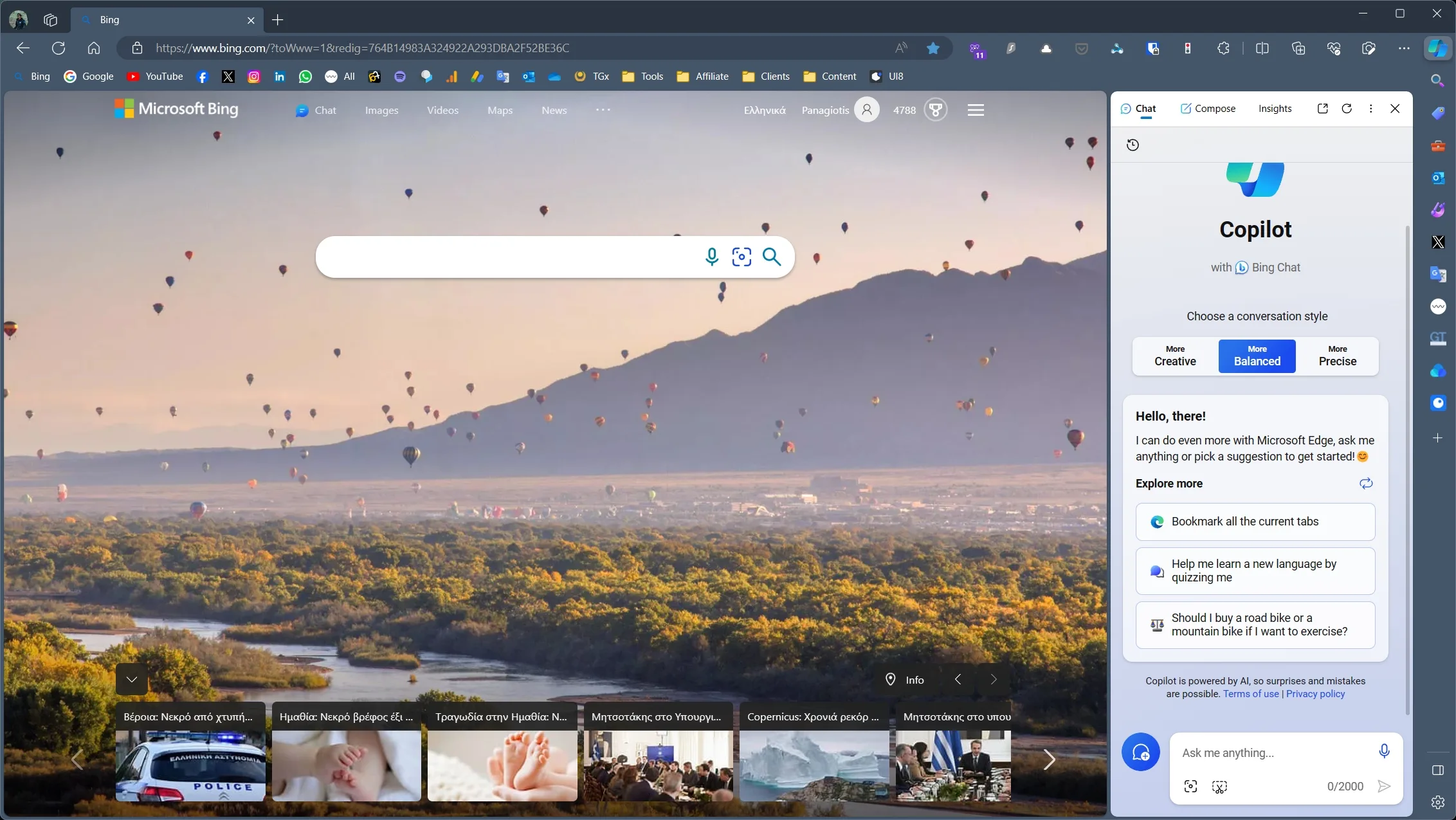
Microsoft’s new Edge browser is now based on Chromium, and it’s now better than ever before. With a unique and beautiful design that lets you change its colours and themes, or even search and download more from the MS Store, there are a lot of goodies inside Microsoft Edge that you can try out now. And the best of all? It’s available for macOS, Android, iOS, and even Linux.
What I love most about Microsoft Edge besides the modern design is how stable and fast it is. Compared with other browsers, Microsoft Edge doesn’t seem to face any problems running as fast as possible even on the oldest hardware, and the same goes for every operating system that I’ve tried it. It also comes with a big collection of available add-ons you can install from the Microsoft Store, but you also get the option to install extensions using the Chrome Web Store. Apart from that, with Edge, you can also install any website you want as a desktop PWA (Progressive Web App) and have it in your taskbar or menu.
Microsoft Edge also features a sidebar on the right side, from which you can access the Microsoft Copilot, the AI Chatbot that is based on ChatGPT’s GPT-4 language model, the Microsoft Shopping that provides you with coupons and savings, the Tools tab with a calculator, unit converter, translator, dictionary, world clock, and other tools such as a timer, a stopwatch, random number, number converter, QR code, and typing fast mode. You can unpin all of that from the sidebar, or even add your own favorite websites to open with 1 click.
Best web browser for geeks and gamers: Opera Browser
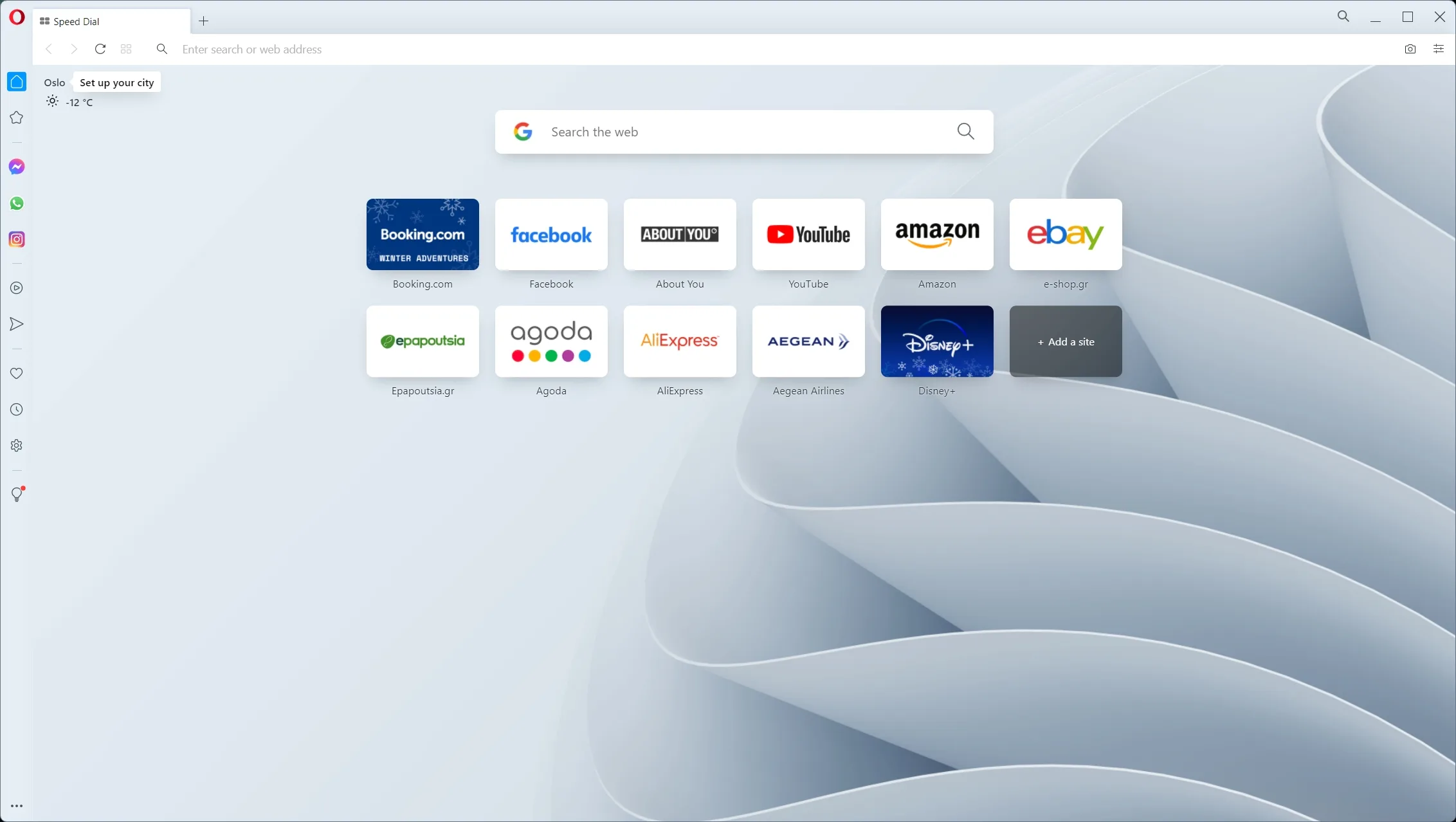
I don’t if Opera’s plan is to become the “coolest” web browser on the market, but they do provide a modern and beautiful web browser that comes in many different versions. For starters, you can use Opera’s default web browser, or grab the Opera MX, which is a web browser designed for gamers. There’s also a version for Chromebooks, which is a nice addition.
Opera is a cross-platform software, available for Windows, Mac, Linux, Chromebook, Android, and iOS. You can download the latest version from their official website, or get it from your operating system’s app store. Opera is also based on Chromium, which provides synchronization between devices, a speed-dial to organize your favourite websites and bookmarks, and a sidebar in the left corner with popular websites such as Instagram, WhatsApp, Facebook Messenger, X, Spotify, and more.
With Opera, you also get a built-in adblocker, which does a pretty solid job at distinguishing the most unwanted ads, but not it’s the best option as it often was unable to stop some pop-up ads and websites that were using redirections after the user clicked for the first time. Last but not least, you’ll also get access to a free and unlimited VPN service (which is actually a proxy, so get a true VPN such as the Surfshark VPN or even Opera’s premium VPN service) you can enable and change between Europe, USA, East, and West Africa. Unfortunately, it’s often very slow and unable to play high-quality videos.
Best web browser for surfing the Dark Web: Tor Browser
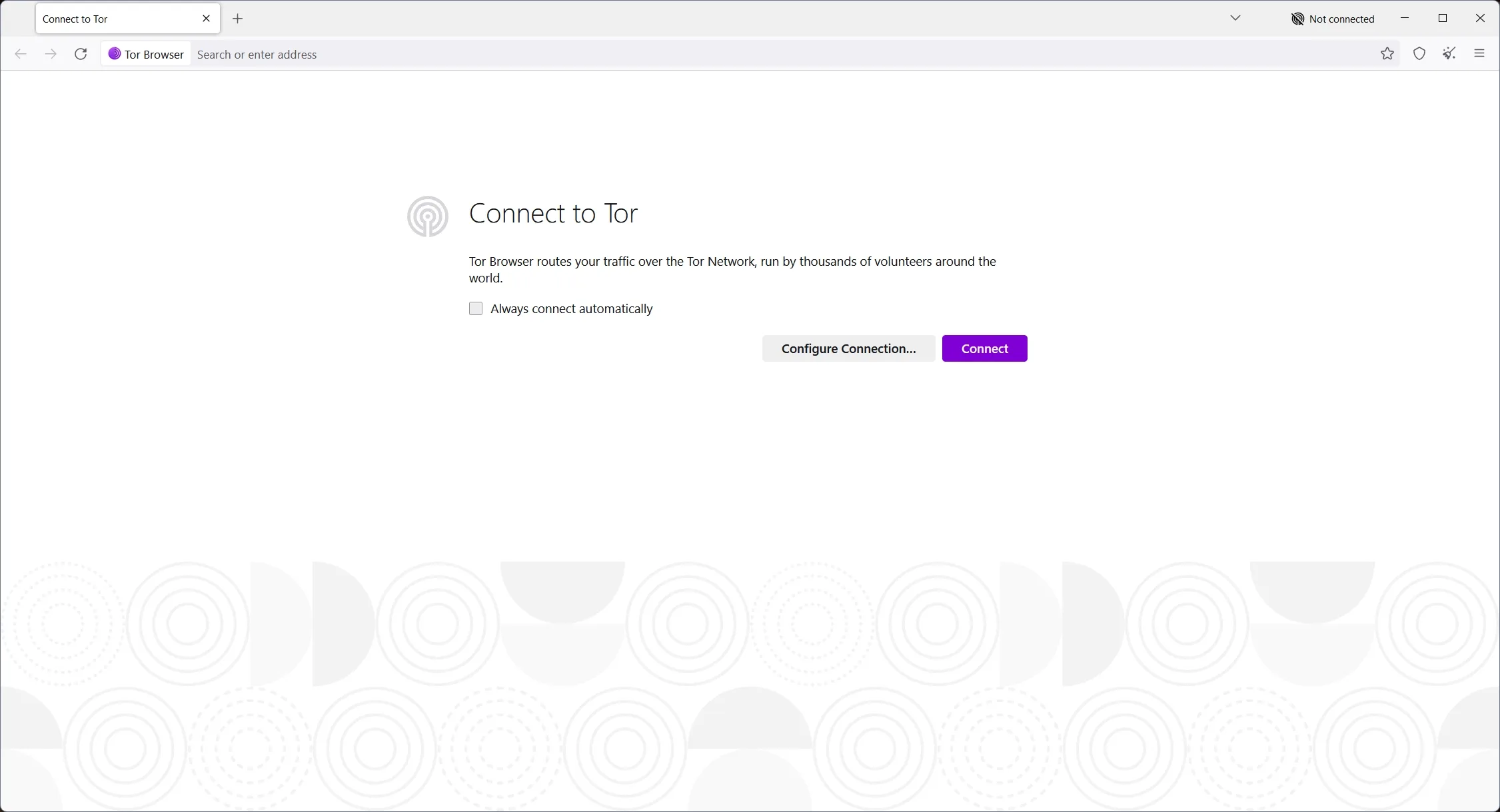
For people looking to go beyond the traditional search engines and see the “deeper” and “darkest” side of the internet, Tor Browser is still the best of the rest, as it focuses on providing enhanced privacy and anonymity online. Tor is also based on the Mozilla Firefox browser, but it operates under the Tor network, which is a decentralized network that aims to increase privacy and security by routing internet traffic through a global network of relays.
With Tor browser, you’ll be able to better protect yourself against tracking, surveillance, and censorship. It is known that the Tor browser is often used by journalists, activists, whistleblowers, and individuals seeking heightened privacy and anonymity online, and even by basic users who want to stay safe. And while there are ways to extend its functionalities using various plugins, the team behind Tor is recommending users not to for better security.
With a quick search online about Tor Browser, you’ll find countless blog posts, forum discussions, and even videos talking about how dangerous Tor can become. And while that’s true to some extent, Tor on its own is not a dangerous web browser, but due to the anonymity and hidden services (often called “deep web” or “dark web” or even “dark net”) it can be used to access some websites with very, very, very bad content. Good news? You’ll probably never find those kinds of sites by accident, so rest assured you only surfing anonymously.
Best web browser for everyday use: Google Chrome
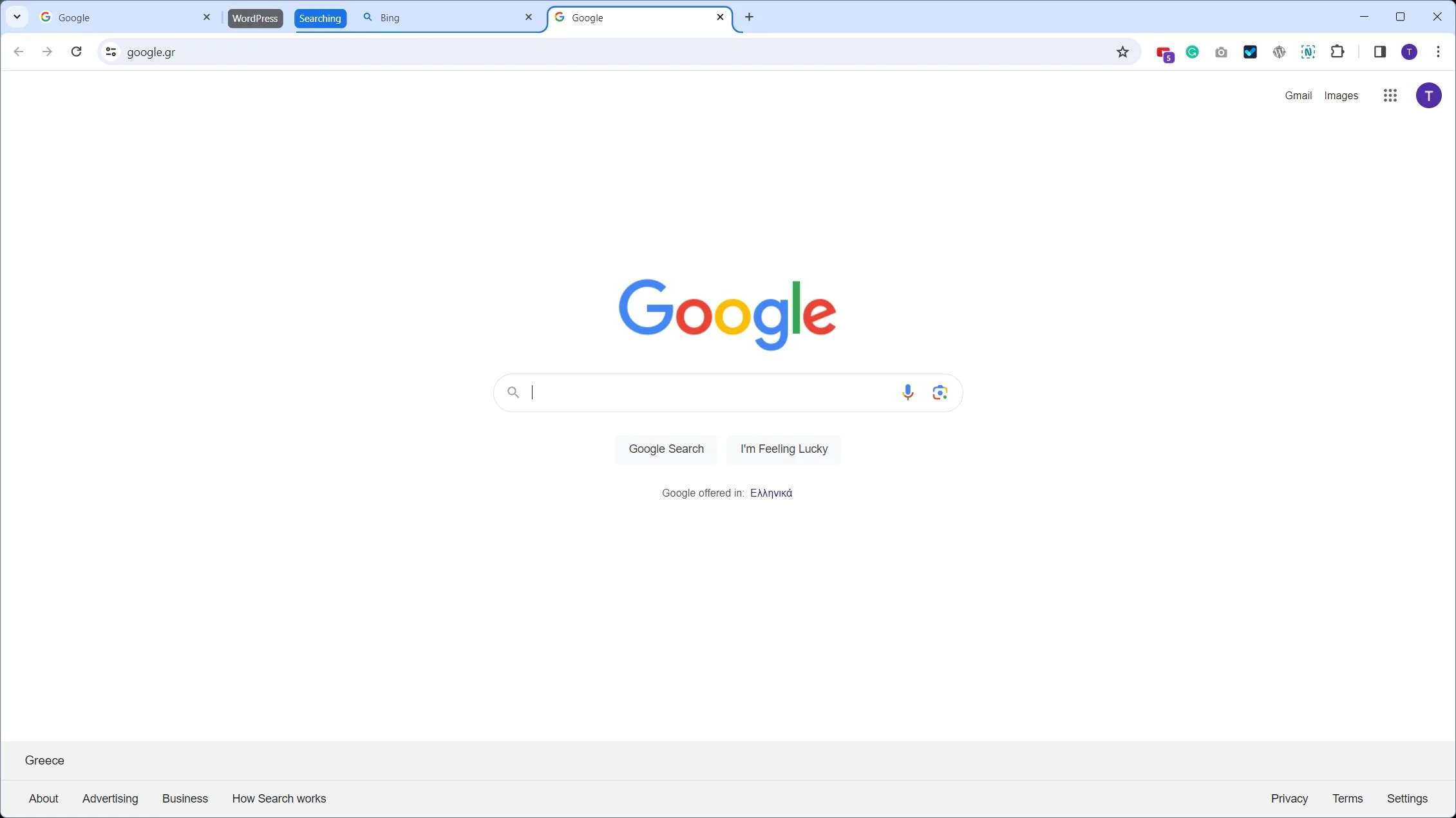
Based on Statcounter’s statistics, Google Chrome has 64.73% of the world browser market share, making it the most popular web browser. The browser also comes pre-installed with every Android phone, and it’s also available on all Chromebook devices. For most users, Chrome should be fine, providing a fast and minimal experience, and millions of available extensions that you can install. It has a large number of themes created by both Google and its community of users and synchronizes your information between devices with your Google account.
Apart from that, Google Chrome is just a basic browser for basic users. It doesn’t have the same tab management as Vivaldi, but it does let you create tab groups with different colours and rename them, which is a nice addition to its features. Managing multiple Chrome accounts is also pretty easy, and a PWA prompt is displayed every time a website offers a progressive web app.
What may concern you is the information Google collects from you whenever you use their software. I won’t get you bored with any technical details, but it’s a long list of personal data that is being collected by one company. If you want to know more, go to The Hacker News article which reveals how much data Google is collecting from their users.
Best web browser for minimalists: Arc Browser
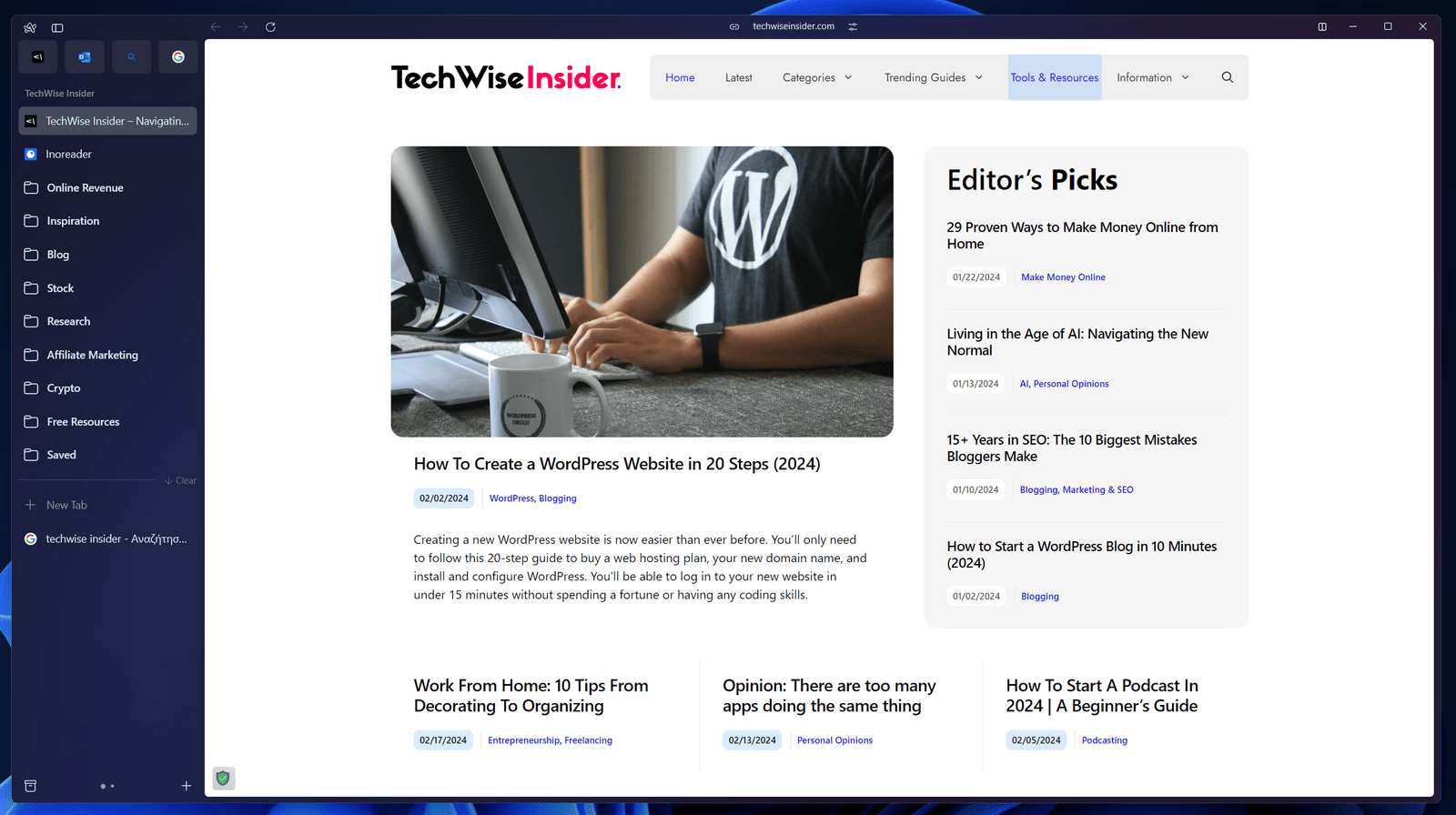
Arc Browser is the new kid in town, and it’s one of the coolest of them all. It’s a new web browser developed by The Browser Company and its main focus is to bring order to online chaos. Arc is based on Chromium, which means it comes with stability, safety, and compatibility with any website. It lets you install all the extensions found in the Chrome Web Store, and it comes with Spaces and Archives, two features that most minimalists will probably love.
The modern interface and having all the tabs (active windows) just aside from the left sidebar make it unique, beautiful, and well-formed. It’s easy to navigate everywhere, it’s fast and stable every time I use it, and it just isn’t laggy as most new apps are in their early stages. It comes with Mica and Acrylic themes, depending on your personal taste and preferences, and it takes the colours that you’ve added in your Windows settings, to look even better.
And yes, importing your bookmarks is possible through any web browser, and it can even detect and import bookmarks, history, passwords, and other information from multiple accounts. Once the import is completed, you’ll have them all organized inside a folder, and you can then organize them as you see fit. Last but not least, you can create an account and sync all of your data, and the company says that they don’t track their users.
Here’s my full review over The Boring Company’s new web browser:
Best minimal and beautiful Firefox-based browser: Zen Browser
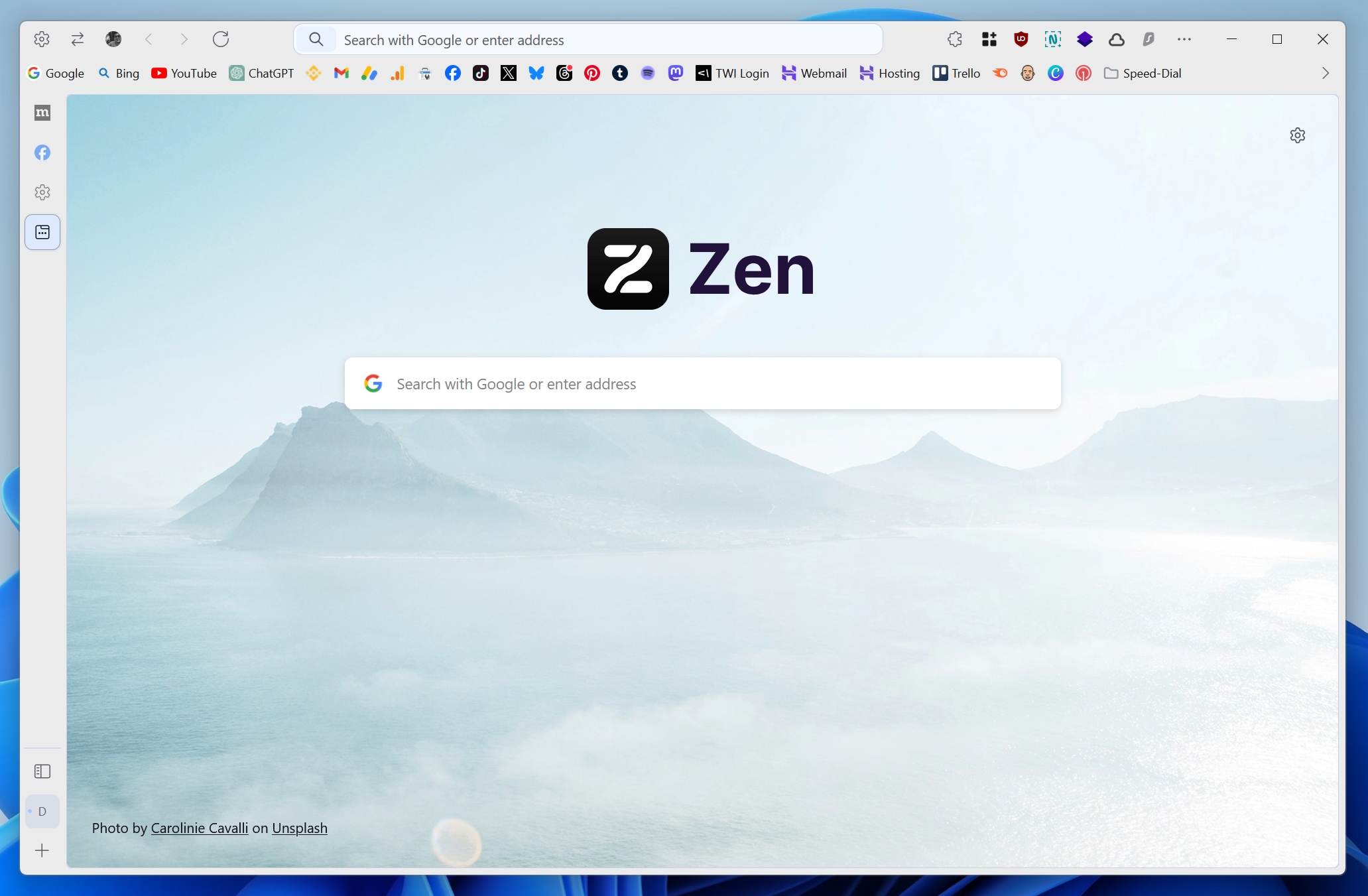
Zen Browser was a big surprise when I first found it. At first glance, it’s based on Firefox and not Chromium, which makes a big difference for many people, and especially considering that it doesn’t collect, share or sell your data to third parties. Like Arc, it has vertical tabs located at the left sidebar, which you can automatically hide by enabling the compact mode.
The browser fully supports Firefox’s extensions, but you’ll find their Zen Theme Store as an additional place from which you can quickly install themes and mods that are created with Zen in mind. Mods are the best thing about Zen, as you can install as many as you’d like and literally add more features to the browser, adjust its interface, and so much more.
This is a community-driven web browser which takes privacy and simplicity very seriously, and as you have already guessed, it’s also an open-source project, with its code being available on GitHub. You can learn more about it in my review but do keep in mind that it’s still in the Alpha version (although it has been stable for almost all my tests).
What is the best overall Web Browser in 2025?
Well, that depends on your personal preferences and needs. Every web browser has something to offer, but finding the right one should be done during your own tests.
For example, I use Vivaldi as my default web browser for many different reasons, including the customization options, the built-in tools provided, the unique tab management features that let me stay organized, and that is primarily a security and privacy-focused browser is some of the main reasons. It also has a big and active community which you get part of, and they’re also supporters of the Fediverse. They provide their own email system, calendar, and even an RSS Reader to keep updated with all your favourite websites and blogs.
Common users may want to stick to Google Chrome, Microsoft Edge, or even Mozilla Firefox. Brave, Tor, and even DuckDuckGo are also great options when it comes to enhanced security, and they are pretty fast and more lightweight than Chrome. Opera is also a great option when it comes to something more modern and slick, and you can also check their gaming browser for better options when it comes to CPU consumption while gaming and browsing.
Just test a few options, see what fits, and stay with it. Nowadays every web browser lets you export and import all your settings, including your bookmarks, history, saved passwords and forms, and more, so moving to an alternative is as easy as exporting and importing a file.
What browser are you currently using on your PC and phone? Are you happy with the way it works, or would you want something to change or get improved? I’d love to know your personal opinion of your web browser of choice in the comment section at the end of this post.



